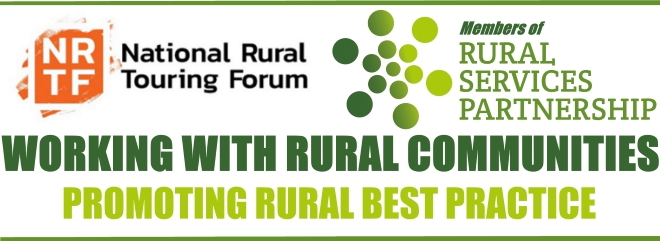T: 01822 851370 E: [email protected]
Visit RSN Survey about life in rural England to find out more.
Rural Touring could win back audience confidence on behalf of the cultural sector

Rural Touring could win back audience confidence on behalf of the cultural sector - but it will need investment and careful thought, for that to be safe and successful.
The National Rural Touring Forum (NRTF) believes Rural Touring venues could offer a safe place for audiences to see shows earlier than urban venues and larger institutions. Rural Touring venues are smaller spaces, hosting smaller performing companies, with local audiences who know each other and who often walk to get there. There is a determination amongst the Rural Touring community to support artists, support rural audiences and re-ignite the magic that is Rural Touring. However, there are several considerations which need to be in place to ensure safety.
Audiences and promoters tend to be older and therefore more at risk and vulnerable to the pandemic. The Rural Touring sector has stated that opening doors will only happen if promoters (the volunteers who put on the shows) and their communities are happy and feel safe to do so. Any risk must be mitigated with steps in place to ensure safety and adherence to government guidelines. Distancing will be an issue if a village hall which has 100 seats now needs to sit audiences 2.5 metres apart, reducing capacity to 30. This is a significant loss in ticket revenue.
There will need to be more handwashing stations, which will cost money and time to sort. Online payments and ticketing systems with card payments will need to be set up, demanding reliable broadband – something which is not always available in rural areas. Performers, who may normally stay in local digs, will need to stay in hotels, stretching touring budgets. If audiences are expected to wear masks, artists might need to as well how does this effect a show? The wellbeing of artists, promoters and audiences will be of paramount concern.
Rural communities are going through this pandemic collectively. People have stepped up with support for their neighbours, particularly those more vulnerable and isolated. Rural Touring schemes are finding innovative ways of continuing their connectivity to audiences and offering employment opportunities to artists. Projects such as art packs, postcard plays, sound pieces, window galleries and more are underway. One of the 30 Rural Touring schemes that NRTF represents asked its mailing list members which type of venue they would feel most comfortable walking into first. The results were clear that a local space, particularly a village hall, came out on top.
The scheme director says, “The survey of 630 people shows our audience sample is least concerned - or most comfortable - about returning to a village hall before any other type of venue.”
“I live in a village and we’ve very much gone through this together. I know who has been unwell, who goes where to shop and the general health of my community. I would be much more confident to see a production in my local hall than I would travelling to a larger theatre” Holly Lombardo, NRTF Director
Confidence in seeing live theatre and productions could start with Rural Touring. Re-ignition is likely to be earlier here than other parts of the creative sector. It will take innovation which will come from Rural Touring schemes working with artists. A collaborative off-line response to the position we find ourselves in – not being able to present live shows – is already being generated by the Rural Touring sector. It will take into consideration those who are isolated, those who are less digitally literate and who don’t have access to the online events on offer.
“We want to support artists, stay in touch with our local promoters and audiences and offer offline opportunities and creative events that retain the intimacy of a live show and the feeling of a shared experience” NRTF Director, Holly Lombardo
NRTF will continue to work to support the resilient recovery of the sector beyond the pandemic.



